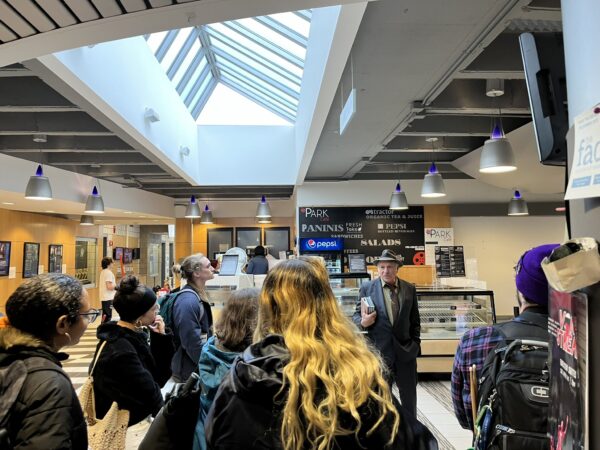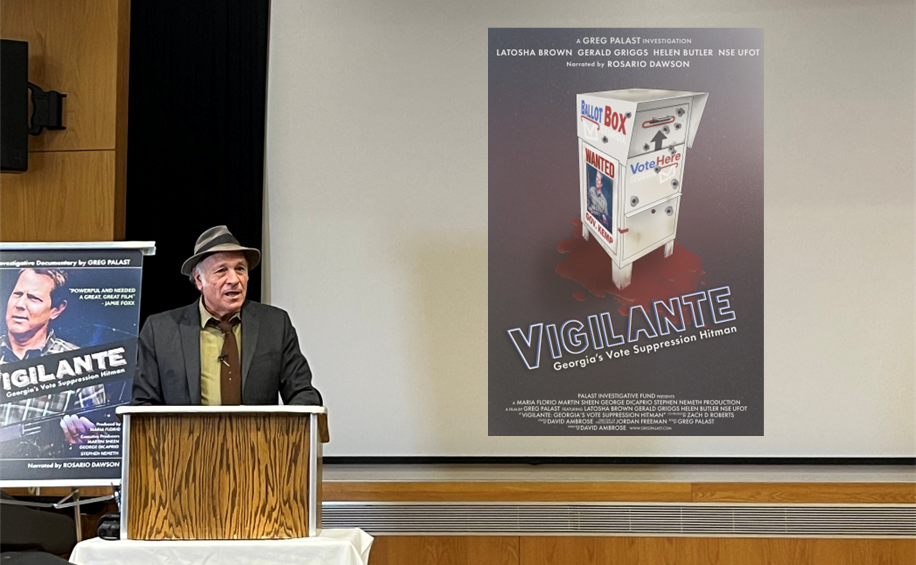On March 31 the auditorium of the Roy H. Park School of Communications was full of students listening intently as Greg Palast detailed his experiences as an investigative journalist.
An internationally renowned investigative reporter, Palast ran this informal master class about the skills, strategies, tools, and conceptual thinking necessary to undertake investigative journalism that packs a punch and changes thinking.
Palast is known for complex undercover investigations, spanning five continents, from the Arctic to the Amazon, from the Congo to California, using the skills he learned over two decades as an investigator of corporate fraud on behalf of the U.S. Department of Justice, 20 attorneys general, and governments from England to Brazil.
The class focused on the connections between documentary filmmaking and investigative journalism, which Palast highlighted as he recounted his experiences in producing his most recent film, “Vigilante: Georgia’s Vote Suppression Hitman,” a searing documentary that focuses on the voter suppression tactics used in Georgia.
During the talk, Palast discussed his extensive work investigating voter suppression in the United States.
“I do financial investigations, energy investigations — many topics — but I keep coming back to voting.” Palast emphasized, “If you lose your vote, you’ve lost everything. This is crucial and we are still not dealing with his issue in America.”
Palast detailed the work that went into uncovering the massive scale of the voter suppression attempts in Georgia, which were engineered by Brian Kemp to ensure victory in his rematch with Stacey Abrams.
“We hired a team of the nation’s top data experts to go name by name through half a million voters that were removed from the voter rolls … We got proof that over 340,000 were removed illegally and wrongly … We went through and found all these voters who were innocent, whose only crime was voting while Black.”

Greg Palast hangs out in the lobby of the Roy H. Park School of Communications, talking with students and answering further questions.
Palast highlighted the differences between investigative journalism in the U.S. versus overseas, referencing his time working for the BBC in the United Kingdom, which included staking people out and confronting people if they refused to give an interview — practices generally frowned upon in mainstream media.
He spoke about the shortcomings of mainstream media to provide hard-hitting investigative journalism, recounting his own experiences of mainstream outlets dismissing his work.
“It is very difficult to get investigative reporting on the airways in the U.S.,” said Palast. “If you want to get the word out you need to do it independently.”
When a student expressed worry that American citizens have grown to view most news media as untrustworthy, Palast countered his concern, stating he was glad people are growing to be more critical of mainstream news.
“There’s tremendous suspicion of journalism for damn good reason. I’m glad that the American public has caught up that mainstream journalists are giving you the corporate line, and it’s planted news, and it’s junk.”
Addressing students in the audience interested in pursuing journalism as a career, Palast concluded:
“Your job is not to get published or famous a 7-figure salary … the real job of investigative journalism is to uncover facts that they don’t want you to have. That means whatever it takes to get that information, and that’s our job. And it’s not an easy job, and you will not be thanked for it. And you won’t get many awards … but you’ll have something else: you’ll have the truth in your fist. And that’s a very powerful weapon.”

